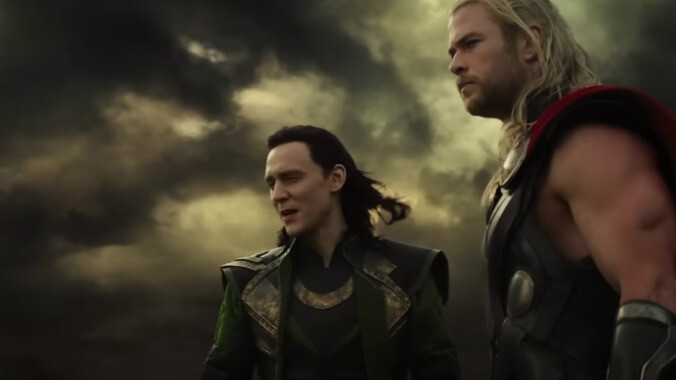10 years later, it's almost quaint to think of Thor: The Dark World as the MCU's nadir
Neither a lost masterpiece nor poison garbage, the first Thor sequel now lies somewhere in the middle of the Marvel pack

In 2013, the Marvel Cinematic Universe was going through a transition. With the help of new owners at Disney, the studio had successfully pulled off The Avengers the year before, and two of the undeniably greatest entries in the long series were just ahead in 2014. But the two movies released in 2013 struggled under the increasing pressure of the MCU. Iron Man 3 was criticized for feeling a lot like an anti-Iron Man movie that made some of the actual superhero action feel weirdly tacked on (but that’s what makes it good, actually). And the much-derided Thor: The Dark World seemed like all of the still-young MCU’s worst impulses being brought to light for the first time: A forgettable villain, a largely pointless MacGuffin, and a tiring dependence on Infinity Stone mythology that wouldn’t pay off for several more years.
But the MCU has grown a lot creakier in the last decade. Those worst impulses are more noticeable than ever, even when there are still good movies coming out of Kevin Feige’s marvelous machine, so it’s the perfect time to consider reappraising Thor: The Dark World. Is it really worse than, say, Black Widow and Eternals and Doctor Strange In The Multiverse Of Madness and Ant-Man And The Wasp: Quantumania and Thor: Love And Thunder and Avengers: Age Of Ultron? (Just to name a few random examples.) Or was it just one of the first MCU movies to feel like a real stinker, beyond even the general disappointment of Iron Man 2, and that feeling has stuck with everyone ever since?
It would be nice to think of Thor: The Dark World as a lost, hidden gem of the MCU; a great work of superhero art that nobody appreciated at the time and has become more special in retrospect. It’s not. What it is, is perfectly fine. The Dark World is no longer the low point of the MCU, and by comparison to some of the lesser films that followed, it is very watchable—almost annoyingly so.
The main plot, wherein a villain from another dimension is trying to steal some amorphous space blob that will allow him to whatever, is exceedingly dull, and it no longer has the relative uniqueness and fish-out-of-water comedy that buoyed the first movie. Even Chris Hemsworth’s Thor, who didn’t really come alive until Taika Waititi took over the series with its next movie, only shows the slightest spark of his generally abundant charisma (his best moment is just minutes into the movie, when he makes a joke at the expense of a monster and grins at the mocking laughter he gets in response).
And yet… every few minutes you know that Tom Hiddleston’s Loki will show up, and while Hemsworth has yet to really solidify what makes a good Thor performance, Hiddleston is significantly more dialed in than he was in the first movie or The Avengers. The movie temporarily wakes up the moment Thor breaks Loki out of prison so he can help fight the bad guys as vengeance for the murder of his and Thor’s mother, thanks to both the sequence where Loki keeps shape-shifting into people he thinks Thor would rather be teamed up with (including Captain America, giving Chris Evans a short cameo), and the subsequent scenes where Thor and Loki use their respective talents to try and outsmart the villain.
This Loki, much more than the weird misogynist Joss Whedon wrote in The Avengers, is more like the Loki who was so great in Ragnarok, and who gave his life to save Thor in Avengers: Infinity War, and who now has his own spin-off show on Disney+… though that’s technically a different Loki, what with the multiverse and all that.
But if it’s not Loki, then it’s Kat Dennings’ Darcy Lewis who quietly carries chunks of the movie. Returning from the first Thor, where she was sort of the “what’s Norse mythology?” audience surrogate, Darcy’s main role this time is livening up boring exposition scenes that would otherwise have to be carried by Natalie Portman’s Jane Foster—who, despite being a more active participant in the plot, doesn’t get to do anything fun or interesting here.
The movie’s best line, just a few minutes after Thor’s little grin, comes when Darcy and Thor are reunited and she asks him how “space” is, to which he responds: “Space is fine.” Is it laugh-out-loud funny? No, it’s just a cute little moment that feels at least a little real in a movie that is otherwise 90 percent magic portals. In a worse movie, perhaps one that truly is the undeniable lowest point out of almost three dozen films, Dennings’ self-aware “this thing we’re doing is weird” commentary would be deeply off-putting (and it’s something that pretenders to Marvel’s throne, and some Marvel movies, often screw up), but she’s so good at it that it balances the dumb plot beats.
See, Thor: The Dark World isn’t a terribly bad Marvel movie, and it’s definitely not the worst Marvel movie, it’s just a Marvel movie that happens to be on the poorer end of the spectrum. It’s one of the first entries in the canon that really clearly defined what a Marvel movie is, in a bad way, which was more jarring at the time than it is now. But here, in 2023, we’re all older and wiser than we were at the time, and it’s clearer than ever that Thor: The Dark World is fine.